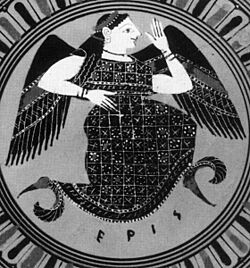Eris (mythology) facts for kids
Quick facts for kids Eris |
|
|---|---|
| Goddess of strife and discord | |

Eris on an Attic plate, ca. 575–525 BC
|
|
| Abode | Erebus |
| Symbol | Golden Apple of Discord |
| Personal information | |
| Children | Dysnomia, Ponos, Atë, Lethe, Limos, Algea, Hysminai, Makhai, Phonoi, Androktasiai, Neikea, Amphilogiai, Horkos, Pseudea, Logoi |
| Parents | Nyx or Zeus and Hera |
| Roman equivalent | Discordia |
Eris ( Greek: Ἔρις Éris, "Strife") is the Greek goddess of strife and discord. Her Roman equivalent is Discordia, which means the same. Eris's Greek opposite is Harmonia, whose Roman counterpart is Concordia, though she is also described as opposing Nike, counterpart of the Roman Victoria. Homer equated her with the war-goddess Enyo, whose Roman counterpart is Bellona. The dwarf planet Eris is named after the goddess.
It is unknown whether she had any temples or sects in Greece. She is often invoked as a personification of strife, as which she appears in Homer and many later works.
Etymology
Eris is of uncertain etymology; connections with the verb ὀρίνειν orínein, 'to raise, stir, excite', and the proper name Ἐρινύες Erinyes have been suggested.
In Greek mythology
The most famous tale of Eris recounts her initiating the Trojan War by causing the Judgement of Paris. The goddesses Hera, Athena and Aphrodite had been invited along with the rest of Olympus to the forced wedding of Peleus and Thetis, who would become the parents of Achilles, but Eris had been snubbed because of her troublemaking inclinations.
She therefore (as mentioned at the Kypria according to Proclus as part of a plan hatched by Zeus and Themis) tossed into the party the Apple of Discord, a golden apple inscribed Ancient Greek: τῇ καλλίστῃ, romanized: tē(i) kallistē(i) – "For the most beautiful one", or "To the Fairest One" – provoking the goddesses to begin quarreling about the appropriate recipient. The hapless Paris, Prince of Troy, was appointed to select the fairest by Zeus. The goddesses attempted to bribe Paris to win his decision. Hera offered political power, while Athena promised infinite wisdom. But Aphrodite tempted him with the most beautiful woman in the world: Helen, wife of Menelaus of Sparta, and Paris chose to award the apple to Aphrodite, thereby dooming his city, which was destroyed in the war that ensued.
In Roman mythology
Discordia, the Roman counterpart of Eris, embodies similar attributes of strife and discord. While sharing the fundamental essence of her Greek counterpart, Discordia possesses distinct Roman characteristics and narratives. In Roman mythology, Discordia is often portrayed as the personification of chaos and strife, representing the disruptive forces that can unsettle order and harmony within society. She is typically associated with the concept of dissension and conflict, symbolizing the breakdown of social cohesion.
In Roman mythology, Discordia is often intertwined with various tales of love and rivalry. While not traditionally depicted as having consorts or lovers in the same manner as some other Roman deities, her influence is evident in stories where conflicts arise due to jealousy, ambition, or betrayal. Discordia's presence exacerbates tensions and fuels the flames of discord, leading to dramatic consequences for mortal and divine alike. The most notable example of this simply follows the Greek story of the Judgement of Paris.
One notable aspect of Discordia's mythology is her role in the political and social sphere of ancient Rome. As a personification of discord, she was invoked during times of political unrest or upheaval, serving as a symbolic representation of the turmoil and division within society. Her influence extended beyond individual conflicts, shaping the course of history and influencing the destiny of nations.
Despite her association with chaos and strife, Discordia was not always viewed in a negative light. In some interpretations, she served as a catalyst for change and transformation, challenging established norms and fostering innovation. While her disruptive influence could be destructive, it also paved the way for renewal and growth, highlighting the complex nature of her character within Roman mythology.
Cultural influences
The classic fairy tale "Sleeping Beauty" references what appears to be Eris's role in the wedding of Peleus and Thetis. Like Eris, a malevolent fairy curses a princess after not being invited to the princess's christening.
The concept of Eris as developed by the Principia Discordia is used and expanded upon in the 1975 science fiction work The Illuminatus! Trilogy by Robert Shea and Robert Anton Wilson (in which characters from Principia Discordia appear). In this work, Eris is a major character.
Eris, the "Goddess of Discord and Chaos", is a recurring antagonist in the animated television series The Grim Adventures of Billy & Mandy, wherein she is depicted as a spoiled and wealthy woman that wields the "Apple of Discord".
Similarly, Eris, the malevolent "Goddess of Discord and Chaos", is the main antagonist in the DreamWorks 2003 animated movie Sinbad: Legend of the Seven Seas against Sinbad and his allies.
The dwarf planet Eris was named after this Greek goddess in 2006.
In 2019, the New Zealand moth species Ichneutica eris was named in honour of Eris.
See also
 In Spanish: Eris (mitología) para niños
In Spanish: Eris (mitología) para niños


